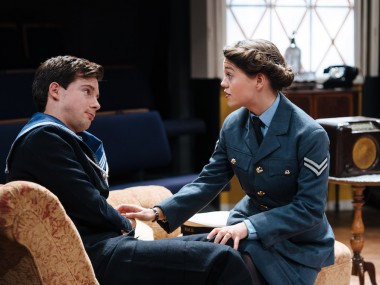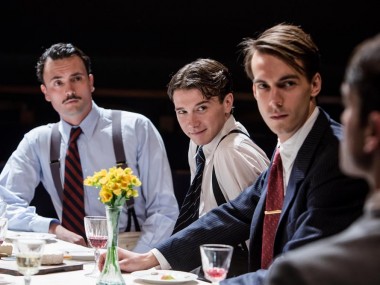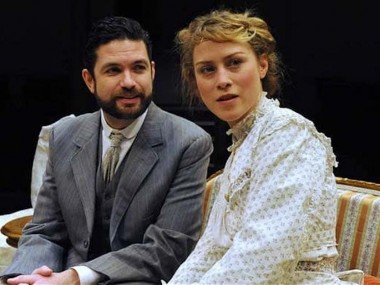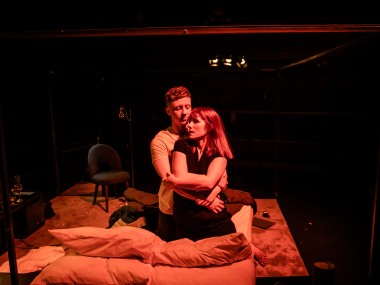In Praise of Love, Orange Tree Theatre
Friday 13th June 2025
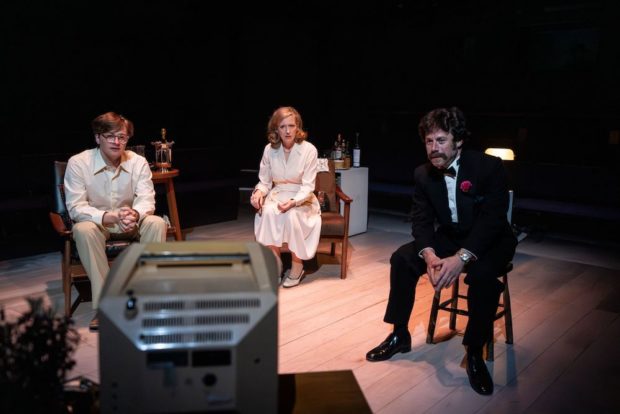
Only the truth, we are told, can set us free — but there are times in love when the New Testament Gospel of John is an inadequate guide. A good example is the situation that Terence Rattigan explores in his rarely revived penultimate play, In Praise of Love, now billed as a “rediscovery” at Tom Littler’s enterprising Orange Tree Theatre. First staged some years after Rattigan’s reputation had been thoroughly trashed by the Angry Young Men and sunk under the new waves of the 1960s, it follows this venue’s other successful celebrations of the playwright’s work, namely French Without Tears (2015) and While the Sun Shines (2019).
This time it’s serious themes: love, lies and death. Sebastian, a Marxist literary critic for a Sunday newspaper, met his Estonian wife Lydia when he was a wartime intelligence officer and she was a refugee who’d survived a concentration camp. The couple are a study in concealment: she knows she’s very ill, but hides this from her husband. He knows she’s dying, but doesn’t tell her. Oblivious to this, their son Joey is an aspiring playwright at present also campaigning in a by-election for the Liberals, a party his disapproving father calls “crypto fascists”. In their Islington family home, they are visited by Mark, Sebastian’s friend and a successful American novelist who’s in love with Lydia.
Rattigan handles this emotional triangle — with its curious echoes of the Jimmy-Alison-Cliff relationship in Look Back in Anger — with typical restraint. Concealment of Lydia’s condition is presented as acts of kindness, and there’s a sense of dutiful sacrifice that is more typical of the 1950s than the 1970s. Lydia’s skill with deception extends to her son, whose first play is being aired on the BBC, a fact that his father has clearly forgotten, and her attempts at covering up his indifference give the play’s second half its emotional tension. Eventually, the truths of the family situation come to light, and the play ends with a mildly optimistic sense of healing.
What Rattigan shows is the psychological symmetry of husband and wife deceiving each other, each believing that in order to be loving you also have to be false. In this set-up, Sebastian is also having an affair with Prunella, one of his offstage colleagues. More concealment, more tacit understanding. At one point, he talks about “the English vice” — “our refusal to admit to our emotions” — which is classic Rattigan territory, and while hypocrisy is presented as a characteristic of Englishness, it is challenged by the younger generation. Sebastian is more whisky socialist than champagne socialist, and his self regard fuels his complacency. As a foreigner, Lydia is less restrained, but her credo is perfectly in tune with her adopted country: “Honesty between people who love each other is the thing that matters least in this life.” And her admonition to her son is “Pretend like hell.” Clearly, this is a picture of love in a time of moral self-sacrifice, smoothed over by untruths.
Rattigan outlines the England of the early 1970s with mentions of striking workers, and Sebastian’s old-style Marxism is criticized as being detached from reality. Typically, he attacks both Tories and Labour, seeing them as basically the same capitalist parties. It’s an ultra-left attitude that persists to this day. In a memorable passage, Sebastian describes the horrors of Lydia’s experience of Nazi and Soviet murderous aggression, and shows how her present illness is a legacy of wartime deprivation. Rattigan is also sensitive to Estonia’s plight in the postwar Soviet bloc, and the parallels with Ukraine and other genocidal situations today is striking, giving additional relevance to this story of the English character under strain. At the same time, there is material here about cultural politics: Sebastian is elitist, viewing Mark’s bestseller writing as populist rubbish. Mark, for his part, is generous to Joey, encouraging him to write.
In Praise of Love was, apparently, loosely inspired by the relationship of star actors Rex Harrison and his sixth and last wife, Kay Kendall: Harrison was having an affair with her and then proposed when he found out she was terminally ill with leukaemia, all the while keeping the diagnosis from her. She died in 1959. Originally written as part of a double bill in 1973, it must be said that the play is not Rattigan at his best. The dialogues are stilted, there is little subtext and the plotting is clumsy. Worst of all the character of Sebastian, an opinionated selfish boor, seems modelled on John Osborne’s Jimmy Porter, but lacks the original’s battered charisma. Rattigan’s antihero treats both Lydia and Mark as his servants, and his aggressive posturing is hard to empathize with.
The only time I’ve seen this play before today was in an extremely elegant modernist version in Moscow in the early 1990s, although my ignorance of Russian meant I only understood it partially. Now I can better appreciate how its references to Stalin, Marxism and the chaos of postwar Europe were particularly resonant to that post-Soviet audience. Directed at the Orange Tree by Amelia Sears and designed by Peter Butler, the play, for all its imperfections, still speaks down the years, especially to anyone who remembers 1970s Britain. There are solid performances by Claire Price (Lydia), Dominic Rowan (Sebastian), Daniel Abelson (Mark) and Joe Edgar (Joey), although some moments are a bit shouty. Still, this production won’t hurt the current campaign to name a West End theatre after its author — truth be told, surely an unconcealed good idea.
This review first appeared on The Theatre Times

